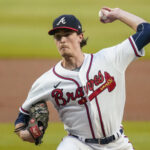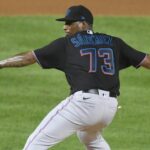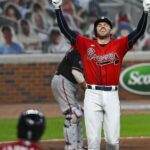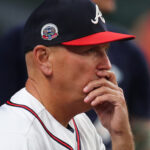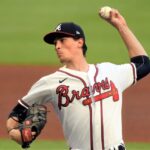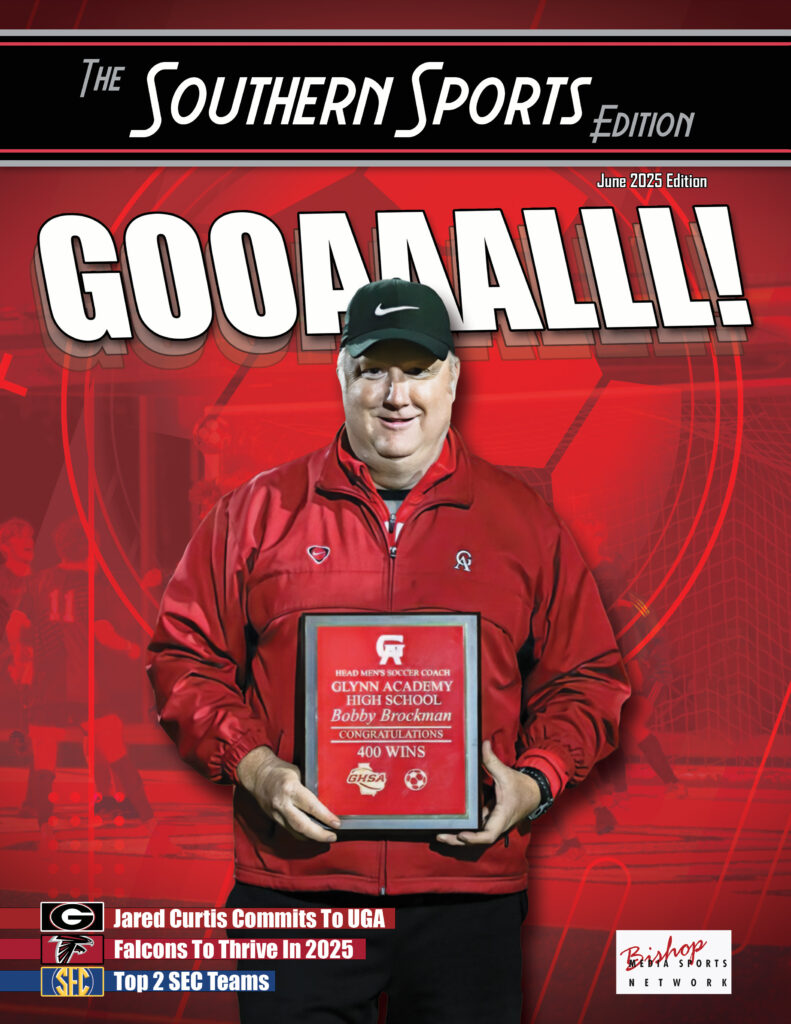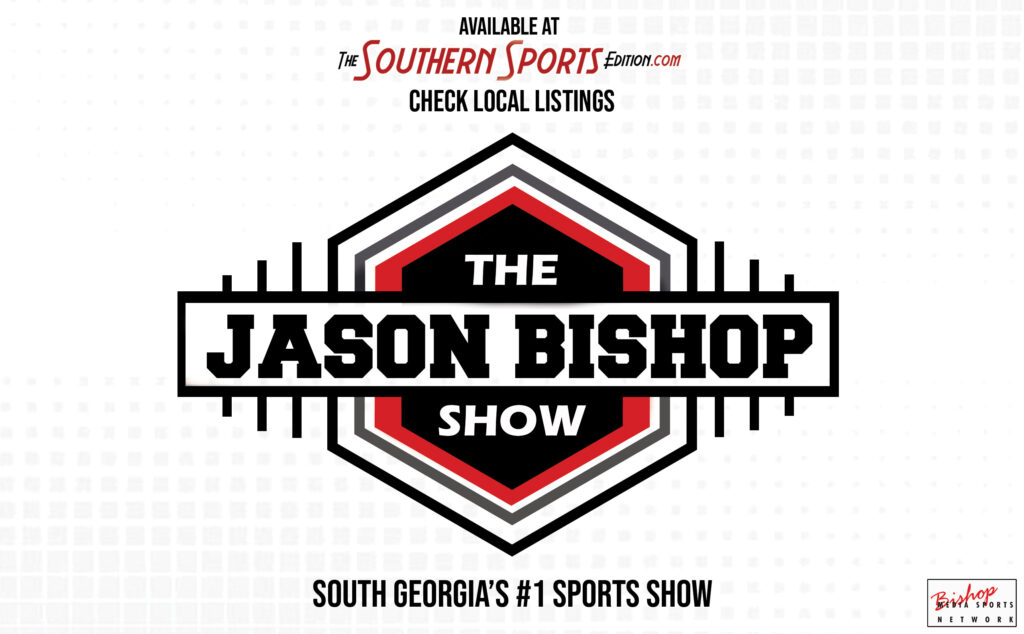MLB
The Hunt For A Brave October
 By: TJ Hartnett
By: TJ Hartnett
TheSouthernSportsEdition.com news services
The Atlanta Braves won their third straight NL East title and are into the playoffs.
Now this isn’t an unexpected development, as the Braves were the favorites to win the East going into the season, but in practice it took a lot more work than many would have thought. The road to the playoffs was a different route than it maybe should have been.
In any case, the Braves will face off against the seventh seeded team at Truist Park, with ace Max Fried taking the mound, and thank god for that.
Fried, who will be the wily veteran of the team’s postseason rotation with about a year and a half of being a rotation mainstay under his belt, left his last start of the regular season after the first inning because he twisted his ankle fielding a ball.
If you happened to feel a shockwave reverberated anywhere in the Southeastern United States last week, that was the collective gasp/groan/heart palpitations of the entirety of Braves Country.
Mercifully, he was only taken out due to precautionary measures (the Braves had clinched the East already). The Braves Cy Young candidate, the undefeated Fried will prevent Brian Snitker from having to run a rookie with only five career starts out for Game 1 of the playoffs.
That being said, let’s look at the rest of the rotation.
For four innings a week and a half ago, it seemed like Cole Hamels would be taking the mound for a postseason start, but after making his one and only appearance for the Braves this season, Hamels went right back to the Injured List and that was that.
So instead, Ian Anderson is likely to start Game 2. He’s looked great in his short time in Atlanta and there’s nothing inherently concerning about having someone that inexperienced start in a playoff game, but we also can’t pretend that we know what to expect.
And really any concern about Anderson starting is compacted with the fact that Game 3, if necessary, will be started by Kyle Wright. He’s been consistently good for fewer starts (three, to be exact).
One of those two young pitchers would probably not garner much of a second thought as the postseason begins but the fact that the Braves are relying on two such pitchers along with their ace barely being out of his own rookie season and nary a veteran in sight is cause for concern.
Sure, the pitchers all have excellent stuff and are capable of shutting down any other team’s offense but with such small sample sizes, they’re simply still unknown quantities.
Which means Atlanta will be leaning on its historically good offense, its exceptional defense, and it’s excellent bullpen to help them win their first postseason series in nearly two decades and advance deep into the playoffs.
And those elements are all terrific. If Atlanta had made it through 2020 with the rotation they’d hoped for way back in February, they might be unstoppable favorites to win the World Series.
As it stands right now, they’re a team with question marks at the most important place when it comes to the postseason.
Prize Fish
 By: TJ Hartnett
By: TJ Hartnett
TheSouthernSportsEdition.com news services
We are now just a week away from the end of the 2020 Major League Baseball season.
Even with a massively expanded postseason this year, or possibly because of that expansion, it’s pretty clear which teams will be present during round 1 of a playoff that will look wildly different for a lot of different reasons.
Basically, with 16 teams making the cut, all of the decent teams and a couple of middling ones will be in on the final hunt for that World Series trophy; and unless something truly wild happens three of those teams will be hailing from the NL East.
The Braves seem destined to win the division and Marlins and Phillies are both over .500.
Miami is too far behind San Diego in terms of winning percentage to take over the four seed in the playoff tournament, but they’ll likely hold on to the five spot and therefore play the Padres in a three-game set taking place entirely at Petco Park.
The Phillies, assuming they don’t usurp the Marlins in second place, can only be seeded seventh or eighth, which has the dramatic possibility of seeing them face off with Atlanta in Truist Park for the first round.
The Marlins are surely going to win the World Series.
Now that might sound that a pretty bold prediction, but history backs me up here.
Sure, Miami’s season-to-season track record has been underwhelming, to say the least (they’ve never won the division since coming into existence over two and a half decades ago). However, they’ve made it to the postseason via the wild card twice and they’ve never lost a postseason series.
That’s right, two trips to the playoffs; two World Series Championships.
It’s really as simple as that. They’re poised to make the cut at the NL East’s second-place team, and history tells us that that means they won’t lose in the postseason.
But for the sake of argument, let’s briefly look at how they’re going to win their inevitable third Commissioner’s Trophy.
It starts and ends with Miami’s starting pitching.
I’ve rambled on and on here about Atlanta’s struggles with the starting rotation and how the young pitchers they call up have struggled. Miami keeps striking gold when it adds starters to the roster.
For example, highly touted prospect Sixto Sanchez has delivered in a huge way for the fish, giving them innings and not giving up runs. He’s looked every bit of what the Marlins hoped he’d be.
He’s got help on the mound from guys like Sandy Alcantara, who’s only made 5 starts but has gone six innings in all but one, giving up three earned runs or less in those 4 games (he gave up 5 in a 4-inning affair during his second start of the season).
Pablo Lopez has looked good too.
Some of their starters haven’t been up to snuff, like Jose Urena, but looking at the more immediately future: it doesn’t matter. You only need three starters in a three-game series.
Their bullpen is led by guys like Brad Boxberger and James Hoyt.
So, while picking the Marlins to win the whole thing this year may seem like a foolish notion, it’s pitching that matters most in the playoffs, and they’ve got a good crew on the mound.
The mere fact that they’ll be there is all the backup I need.
MVP
 By: TJ Hartnett
By: TJ Hartnett
TheSouthernSportsEdition.com news services
It seems bonkers to be thinking about and talking about end of the year awards for the Major League Baseball season when not even two months have passed since the first pitch of the season was thrown, but here we are.
The pandemic-shortened 2020 campaign will be over soon and things like Cy Young Awards, MVPs, Gold Gloves, and Silver Sluggers must be given out.
So, with that in mind, I’d like to make a case for a player who should be the National League Most Valuable Player this season: Atlanta Braves first baseman Freddie Freeman.
Freeman has long been respected as one of the most consistent players in the game, if not the top player at his position.
He’s had All Star appearances, won Gold Gloves and Silver Sluggers, but the one thing (other than a World Series ring, of course) missing from his trophy case is an MVP award.
This year, for all its flaws and weirdness, presents the best opportunity for Freddie to fill that spot on the shelf.
As with most seasons, Freeman has hit for average and power, with good RBI numbers as well as a great OPS and WAR (for you sabermetric fans out there).
But it also seems like every year he hovers just under the radar for serious award consideration.
This year seemed to be shaping up much in the same way, but Freeman has gotten incredibly hot, slugging his first two career grand slams, tons of multi-hit games, and a two-homerun game to boot.
In that stretch, his batting average skyrocketed over .330 and his OPS topped 1.000 (a whopping, and league leading, 1.075). He also is the top of the league in RBI’s, driving in runs at a torrid clip.
But the case isn’t just made because of his numbers alone. The Braves, who have been favorites to win the NL East all season, have seen their starting rotation decimated over the course of the season, and Cy Young candidate Max Fried hitting the Injured List could very well have been the straw that broke the camel’s back.
Short of taking the mound himself, Freddie’s offensive explosion has seen him do everything he can to prevent Atlanta from slipping out of first place in the division, as the Philadelphia Phillies have given chase.
Freeman is also a team player. The Braves third hitter for almost his entire career, he responded well to being moved up to the two-hole after leadoff man Ronald Acuna, Jr. was hurt and kept out of the lineup for a few games.
He responded so well that Brian Snitker has kept him there after the young outfielder’s return.
Credit to where it’s due: Freddie always thrives when someone with some thunder hits behind him.
Last season, Freeman was awarded the Silver Slugger after a year of having Josh Donaldson batting in the cleanup spot.
This year Marcel Ozuna has been a revelation, protecting Freddie and giving opposing pitchers a veritable Sophie’s Choice of who to pitch for in any situation.
In fact, for a while there it looked like Ozuna would be the Braves’ most likely MVP candidate.
While Ozuna continued to thrive in Atlanta, Freeman has jumped into the forefront of the conversation both in Atlanta and, I hope, the minds of the MVP voters.
It’s time for Freddie to stop being the bridesmaid and get married. I now pronounce him the NL MVP.
You may win the World Series now.
Mis-Managed
 By: TJ Hartnett
By: TJ Hartnett
TheSouthernSportsEdition.com news services
Major League managers are simultaneously the most overrated and underrated members of a baseball team, depending on the team’s record.
If the team is winning, then the manager is probably being over-credited. If the team is losing, then the manager is probably getting over-blamed.
This isn’t to say that managers don’t have an important role on a team’s success beyond simply penciling in a lineup, just that sometimes the role of a guy who isn’t actually participating in the game can be overexaggerated in one way or another.
I bring this up because I want to discuss Atlanta Braves’ manager Brian Snitker. Specifically, I want to discuss whether or not he’s actually a good manager for the team of which he is currently at the helm.
I’ll go ahead and spoil the ending: I think he is – which isn’t to say there is nothing to discuss, but there are ways in which he seems to be failing the team.
Let’s talk about the obvious first:
Bullpen Usage. All managers are judged most often and often most harshly on how they implement their bullpen.
It’s the easy thing to criticize, as it’s the primary way in which a manager influences the game while it’s being played.
The inspiration for this article is, in fact, because of Snitker’s sometimes flabbergasting use of his relief corps. Specifically that he brought in Charlie Culberson, a position player, to pitch in the second game of a doubleheader when the Braves were down by just one run.
Charlie Clutch delivered, easily getting the one out he was tasked with getting, but the question is still begged…what?
Especially egregious was this move in light of the fact that A.J. Minter, arguably the Braves’ best bullpen pitcher (in a veritable overflowing pot of good ones) was wasted in Game 1 when the Braves were up 7-1.
There seems to be some kind of a disconnect between Snit and any analytics or forethought in this regard.
Taking that same example as a for instance: he knew they had a whole second game to play that day, so why burn Minter and put yourself in a position to then use a position player on the mound in a tight game? Did the Phillies offense worry him that much?
The bullpen has been overused, certainly, and that’s no fault of Snit’s; the starting rotation has got holes on holes on holes, but why use your talent unnecessarily in a blowout when you have to play another game less than an hour after the first one ends?
There’s also the constant, unending use of Luke Jackson in high-leverage situations.
Now, Jackson’s numbers at a glance aren’t awful (though they also don’t warrant how he’s often used), but he’s constantly getting himself into jams through walks or hits.
Jackson was the saving grace of the bullpen for the first two months of 2019, but it seems almost like Snit still feels indebted to the righty when there are better arms available.
Moving away from the ‘pen, there’s also the curious reliance on guys like Ender Inciarte.
Inciarte has played primarily when Acuna has been hurt. But Ender is so bad at the dish now that any start he gets is a head-scratcher.
Even if the normal starting trio of Acuna, Adam Duvall, and Nick Markakis needs a day of rest, then isn’t even Marcel Ozuna’s sub-par defense overshadowed by his bat?
Ender should be a defensive replacement and nothing else at this point. But Snit keeps running him out there nonetheless.
All that being said, I still think Snit is a good manager or maybe it’s more accurate to say that he’s a good leader, since some of his actual managing leaves a little to be desired.
Why do I say that? Well, two primary reasons: one, his players absolutely love him.
Freddie Freeman has long advocated for Snitker to remain as the team’s skipper, and wanting to play for your manager is not nothing.
Two, his record pretty much speaks for itself. He’s won two straight division titles and has a third in sight. And at the end of the day, winning is what he’s supposed to do.
I don’t know if Snitker is the manager in five years, but for now, so long as the team tries their hardest to win for him, and do, then he’s still the guy.
Midpoint
 By: TJ Hartnett
By: TJ Hartnett
TheSouthernSportsEdition.com news services
On Wednesday, the Atlanta Braves finished up their 30th game of the 2020 season by completing a double header sweep of the New York Yankees.
Usually, the 30th game of the season is unspectacular as a marker of the passage of time within a campaign. But since this is 2020, the 30th game is the halfway point of the whole season.
It also meant that the trade deadline was five days away – tomorrow, as of this article’s publication.
Generally, we would take a look at where the Braves are and where they’re going at the All-Star break (a little past halfway, actually), but even though there isn’t as much to chew on as normal, let’s look at what the Braves have done on the field so far.
We’ve talked about pitching woes ad nauseum, so let me touch on that very briefly. With the injury to Mike Soroka, the continued absence of Cole Hamels, and the ineffectiveness of Mike Foltynewicz, Sean Newcomb, Kyle Wright, and pretty much everyone else; the pitching rotation basically has boiled down to Max Fried and everyone else.
Fried, for his part, could very well win the Cy Young award this season. Everyone else…not so much. Ian Anderson looked terrific in his debut on Wednesday, but time will tell if he can sustain it.
So, with the starting rotation woes being what they are, the team has been relying on the bullpen, the defense, and (honestly a fairly inconsistent) offense. However, the Braves have been winning and are in first place.
The bullpen was a strength on paper going into 2020, and it has delivered. Not every outing is stellar, but very few are disasters.
In fact, before Ian Anderson showed up, the Braves had 16 team wins and Fried was the only starter credited with any – a full ¼ of them, mind you (he’s since upped that number of wins to 5). The relief corps has been invaluable and unfortunately, overworked.
The defense on the team has been solid. Which is unsurprising (with Gold Glove winners like Freddie Freeman and Nick Markakis fielding the ball) and surprising (injuries to Ozzie Albies and Ronald Acuna, Jr. have taken some of the most fleet-footed players off the diamond for extended periods of time).
Marcel Ozuna hasn’t helped too much in this regard, but his value has been immense nonetheless, because of his bat, so let’s get to that.
Ozuna has essentially served perfectly as the replacement for Josh Donaldson in the cleanup spot.
He’s provided power and clutch hits in a way that almost makes it forgivable for Alex Anthopoulos to have let the Bringer of Rain walk to Minnesota. Almost.
Dansby Swanson has been a revelation at the plate, a mini-slump in between two periods of great hitting, notwithstanding.
Outside of Max Fried, I think it’d be hard to argue that Swanson has been the MVP of the season so far.
Not that perennial MVP candidates Freedman and Acuna, Jr. have been slouching.
Acuna, much like the previous two seasons, had a slow first few weeks, but just prior to his injury and since returning, he’s begun heating up.
Freeman was also struggling at first, hitting at the Mendoza line for the first 15 games, but he’s blistered the ball since, averaging out to where we’d expect him to be at this point.
But the real revelation has been Travis D’Arnaud. D’Arnaud was a free agent pickup who has killed the ball at the dish this season, as well as played well behind it.
Tyler Flowers has continued to prove an able backup (he always seems to hit better when the other catcher is having a good season), solidifying the backstop position, which was a question mark in July.
The question is this: can the Braves hold on to first place with the pitching they have?
It’s a great question, and in the NL East the answer might be yes.
However, if any of the other teams get it together and get hot, the Braves may lose that threepeat they’re after.
Early Chatter
 By: TJ Hartnett
By: TJ Hartnett
TheSouthernSportsEdition.com news services
After defeating the Mets 5-3 in 10 innings on Saturday night, the Atlanta Braves evened the beginning of their season to 1-1 with a meager 58 more games to play.
Two games wouldn’t generally provide a lot to chat about, but this is 2020 and everything is either a little or a lot different.
So, let’s take a moment and figure out what we can glean from Atlanta’s first two contests of the season.
Starting at the end: it took only two games before the Braves experienced one of 2020s more drastic rule changes; a runner on second to start every extra inning.
In Atlanta’s case, Adam Duvall started the top of the 10th on second base and the first batter up, Dansby Swanson drove him in to take a lead that the Braves would hang onto in the bottom of the inning.
It’s easy to say that I like the rule since the team I was rooting for won the first time it was used, but I do think it adds an immediate excitement to the game (in addition to being a functional way to shorten games in the middle of a pandemic).
Just look to the bottom of the 10th. The Braves were up by 3 runs, but with only one hit the Mets had the tying run at the plate in the form of last year’s MLB homerun leader Pete Alonso.
They only got one run across the plate, but the tension was great. The very real possibility that the Mets could come back was palpable right away. In short, regardless of how it goes game-to-game, this is going to be an exciting wrinkle to the season.
Let’s turn now to the offense that the Braves have produced over the first two games of the year. The 5 runs in the second game of the series is nothing to scoff at, but up through Marcel Ozuna’s game-tying homerun at the end of the game the Atlanta offense looked downright anemic.
The heavy hitters in the lineup, Freddie Freeman and Ronald Acuna, Jr., have done very little of note so far. Of course, it’s incredibly early, but with a 60-game season Atlanta can hardly afford to take some to warm up.
The pitching, for the most part, has looked good.
Mike Soroka picked right up where he left off with a stellar 6-inning outing on Opening Day, and Max Fried, while a little less in command of the ball, also pitched well.
The bullpen, specifically Chris Martin, was responsible for the lone run that cost the Braves the game after Soroka was pulled. However only one run allowed by the ‘pen is generally an acceptable amount.
Luke Jackson displayed his two trademarks: a) being left in too long (not his fault) and b) making a game unnecessarily close (his fault), but they got the win and you can’t argue with results.
The pitching was expected to be a strength of this team, and it looks like that may hold true.
Some other, quicker points: Pace has long been an issue with baseball, but neither game has seemingly dragged (again, small sample size).
The minimum of three batters for relievers along with the extra inning rule seem like they’ll be effective in this regard.
The DH in the National League has been a long time coming. Technically it’s a “this season only” rule, but I’d bet it’s here to stay.
Chip Caray said that the Mets are expected to make the playoffs. With a whopping 16 teams qualifying this season (if it gets that far), he’s probably right. It’s going to be a wild chase for the series.
Sting Rays
 By: Robert Craft
By: Robert Craft
TheSouthernSportsEdition.com news services
As we get closer to the start of Major League Baseball season, I will dedicate some time to the Tampa Bay Rays.
In a Major League Baseball season, assuming players do play and get through 60 games, and the playoffs are without cancellation, the Rays are set up as well as any other team in baseball for this unprecedented 60 game season.
Opening Day is scheduled for July 24 versus Toronto at the Tropicana Field.
Manager Kevin Cash stated, “in a normal setting, generally, the first month is, let’s see, where we’re at. Let’s not make too many irrational decisions, but that might change a little bit simply because we’re playing 60 games.”
The Rays have three outstanding starting pictures, who could feasibly be not only the best Rays pitcher this season but the Rays have 3 legitimate Cy Young contenders.
Blake Snell, the 2018 Cy Young Award winner, is looking to rebound from an injury-riddled 2019 season. So far in workouts, Snell’s fastball appeared lively during simulated games with his velocity reaching 96 mph.
Kevin Cash named Charlie Morton the Opening Day starter. Morton established career bests in wins (16), ERA (3.05), strikeouts (240), and innings pitched (194 ⅔) in 2019 and finished third in AL Cy Young Award voting.
Tyler Glasnow, to me, looks like an ace in the making. He is a lanky 6 foot 8 and throws an upper 90’s fastball toward the plate. Glasnow might be the best bet to the Cy Young in 2020.
That’s three reasons to pick the Rays to make a run in the short 2020 season.
Then there’s the bullpen; one of the best bullpens in baseball.
There’s lefty Jose Alvardo, who slings a 98-mph sinker and a wipeout slider.
There’s Diego Castillo, who throws 100 mph fastball.
There’s Nick Anderson who throws a 97 mph like soft toss and Chaz Roe, who throws a slider that moves like a frisbee.
There’s no question, the Rays built baseball’s nastiest pitching staff in today’s game and I believe their dominant pitchers will give them a chance in each and every game in 2020.
Position players to watch: Kevin Kiermaier, the speedy center fielder who won his third Gold Glove last season. He is the main defensive star in the Rays’ outfield.
Ji-Man Choi is a left-handed hitting first baseman who hit .261 with 107 hits, 63 RBIs, and 19 home runs. He cut down his strikeout rate to a respectable 22% last season.
Two new additions to the Rays roster this season: Yoshi Tsutsugo and Hunter Renfroe. They seem to be ready to make an impact.
Tsutsugo smashed 139 home runs over the past four seasons with the Yokoham DeNA BayStars in Japan.
Hunter Renfroe hit a career best 33 home runs in 2019 with the San Diego Padres.
Excellent depth seems to be the recipe for success this MLB season. The Rays have an excellent farm system, with great MLB-ready middle infielders and outfielders ready to step up.
Making comparisons in pitching, no team in baseball boasts the depth the Rays have right now.
Look at the last three World Series champs, who’ve all had a strong trio of starters: 2019 Nationals; Strasburg, Scherzer and Corbin, 2018 Red Sox; Sales, Price and Eovaldi and 2017 Astros; Verlander, Keuchel and Morton.
The Rays can win it all in 2020. Let’s just pray they get the opportunity to do it.
The Triumvirate
 By: JJ Lanier
By: JJ Lanier
TheSouthernSportsEdition.com news services
It’s always difficult talking about anyone or anything being the greatest when it comes to sports.
Everyone has different criteria they go by and comparing players or teams from different eras almost never ends well.
So, while I’m sure there will be baseball purists that will disagree with me, or to be honest just fans of a different team, my vote for the greatest starting pitching rotation has to be the 1995 Atlanta Braves.
Now, full disclosure I was a teenager at the time who thought Face/Off was the greatest movie ever made, so there’s a good possibility those baseball purists would be right.
Of course, when I mention the pitching rotation for the ‘95 Braves I’m really referring to three pitchers, Greg Maddux, Tom Glavine, and John Smoltz.
You could argue, and I would probably make the argument, that Maddux was the best pitcher during the 90’s, with the ‘95 season being his best of the decade. Besides winning his fourth consecutive NL Cy Young award, Maddux’s 19-2 record was the best winning percentage of his career and his 1.63 ERA was bested only by the 1.56 he posted the year before.
Those stats, along with his ten complete games and three shutouts, were why I remember feeling Atlanta was going to win every time he took the mound.
I mean Maddux was so dominant that his 3-1 record and 2.62 ERA that postseason, a performance most pitchers would dream of, was actually a letdown compared to his regular season.
1995 may not have been Glavine’s most productive season, although he did finish 3rd in the Cy Young voting, but he was Atlanta’s best pitcher during the playoff run.
The Braves never lost a game that he started and he infamously told his teammates heading into Game 6 of the World Series all they had to do was give him one run and he would take care of the rest; they did and he threw eight innings of one hit, shutout baseball.
Maddux and Glavine may not have been the best one-two punch in baseball history, but if Rush is considered rock n’ roll’s holy triumvirate, then the Braves were baseball’s version with the addition of John Smoltz.
On most teams Smoltz would’ve been the number one starter, or number two, at the very least. Only on this Braves team would you have a pitcher that at that point was a three time All-Star, in the prime of his career, as the third man in the rotation.
Finishing out the rotation was Steve Avery, who was on the same trajectory as Tom Glavine before his career was derailed by injury, and Kent Merker, who was to this Braves team what Pete Best was to the Beatles.
I know this wasn’t the only year this group was together (Maddux, Glavine, and Smoltz all made the All-Star team the following year) but as a collective, this seemed to be their best year.
When you think about it, there’s just something that feels right about the Braves winning their lone World Series title, while in Atlanta, during this season.
I’m sure there are other teams that have had three 1st ballot Hall of Fame pitchers on their roster at one time, but I doubt they all were in their prime.
It’s been twenty-five years and unlike the Nic Cage/John Travolta 90’s action flick, this group’s legacy has actually held up.
Name Change
 By: TJ Hartnett
By: TJ Hartnett
TheSouthernSportsEdition.com news services
After far too much resistance, the Washington Redskins are finally taking a name change into consideration.
It’s crazy that it’s 2020 and the process has just now begun (it feels inevitable at this point, no?), but better late than never.
In the same vein, the Cleveland Indians have apparently begun thinking about a change as well, and in fact Indians manager Terry Francona has even come out in favor of the shift.
As you might expect, the conversation then directed its’ attention to the Atlanta Braves, who were faced with a modicum of controversy during the playoffs last year regarding the now-beloved tomahawk chop (itself a tradition adopted from Florida State University).
The Braves responded by announcing that they are not planning to change the name of the team, but that they are reconsidering the use of the Chop.
I’ve written about this very topic before, and my views haven’t changed: if the Braves name is offensive or hurtful to anyone, then it should be changed. It’s the name of the team, not the legacy or moments that fans cherish – those will remain, regardless of what the Atlanta baseball team have on the front of their home jerseys.
The chop, which I have participated in enthusiastically thousands of times, should almost certainly be no more.
It’s cultural appropriation at its core: a facsimile of a stereotyped Native American war cry done while pantomiming the swinging a tomahawk, which perpetuates the stereotype of the “savage Indian;” and 50,000 non-Native Americans shouldn’t be doing it every night, given the grotesque history our nation has with the people that were here first.
That’s the short version of my take, but instead of rehashing all that, I am going to spend my remaining space not convincing you that the Braves should change their name and drop the chop, but pitching to you what they should change their name to – and how it will help us keep the chop. Sort of.
So, here’s the thing: the tomahawk chop is, as I’ve said, a beloved tradition in Atlanta. But I’ve also said that it needs to go. So how do we keep the spirit of the thing and unity it brings alive while casting out the problematic aspects of it?
First, we change the team from the Atlanta Braves to the Atlanta Vikings. Bear with me.
The Braves become the Vikings, but almost everything else stays the same: we keep the classic uniform design and color scheme; the script “A” on the ball cap; all the things that make our look our look.
We even keep the tomahawk under the team name, only it’s not a tomahawk anymore – under the word “Vikings” is a freakin’ battle ax.
But what about the chop? We can’t keep the chant as is, but there should still be some kind of vocal cry to go along with the chopping motion that we’ve always done, especially now that we have an awesome battle ax. Don’t worry, I’ve got this covered.
Imagine yourself at the ballpark. The Vikings are threatening to rally with two men on and Freddie Freeman at the plate. Normally, this is when you’d chop – but not anymore. Now there’s something better.
Suddenly, roaring through Truist Park’s sound system, comes the ferocious crunch of Jimmy Page’s guitar as the walls echo with the opening riff of Led Zeppelin’s “Immigrant Song.”
The riff blasts four times (edited down from the studio version’s eight), before, along with Robert Plants legendary vocals, the whole stadium – chopping the same way they always have – erupts into the song’s opening battle cry: “AHHHH AHH AHHHHHHHHH AHH!”
The Valhalla Chop. Seriously. Do it right now, wherever you’re reading this. Chop and do the battle cry. You’re right. It’s freaking awesome. Problem solved.
Play Ball
 By: Kipp Branch
By: Kipp Branch
TheSouthernSportsEdition.com news services
Now that baseball seems to be a reality in late July. Let’s take a good look at the Atlanta Braves for 2020.
The 2020 season will be 60 games and the season will feel like a prolonged playoff instead of the 162-game grind.
Let’s take a look at your Atlanta Braves:
Ronald Acuna Jr. is, in my opinion, the best young player in baseball. Acuna will be in the NL MVP discussion this year. Freddie Freeman is also an MVP candidate and at age 30 still has a lot left in the tank. Acuna and Freeman give the Atlanta roster two superstars in the lineup every day.
Marcell Ozuna was added in free agency from St. Louis. Ozzie Albies and Dansby Swanson will be up the middle, with what should be an above average bench featuring Nick Markakis and Austin Riley.
The team did lose Josh Donaldson and his 37 HR’s in free agency, Can Ozuna offset that production?
My Projected Starting Lineup:
Ronald Acuna (RF)
Ozzie Albies (2B)
Freddie Freeman (1B)
Marcell Ozuna (LF)
Johan Camargo (3B)
Nick Markakis (DH)
Dansby Swanson (SS)
Travis d’Arnaud (C)
Ender Inciarte (CF)
I’m assuming Johan Camargo will win the third base job for Atlanta in my lineup card.
Austin Riley may be the future at 3B, but I am betting on a good season for Camargo in 2020.
This batting order is as good as any in baseball in my opinion. Universal DH in the shortened season will be adopted in the National League will give the Braves the opportunity to let Markakis get swings every day to protect his body from the daily grind of the outfield.
Starting Pitching: Alex Anthopoulos went out and signed veteran, lefty Cole Hamels to a one-year deal and signed former Mariner Felix Hernandez also.
Hernandez could be the wild card here if he looks like he did in Seattle. This addition will put the Braves in the World Series discussion. Hamels, who was set to start the regular season on the injured list, should be rested and ready to go now that the season has been delayed.
Mike Soroka, Mike Foltynewicz, who was brilliant down the stretch until getting blistered in Game 5 of the NLDS, Max Fried and Sean Newcomb will be your starters. Soroka will win a Cy Young Award in Atlanta.
Kyle Wright and Touki Toussaint both got big league innings in 2019.
I like this rotation talent wise, and in a 60-game season, the pickup of Hamels and Hernandez could be looked upon as two of the best moves in Braves history.
Relief Pitching: Going into the 2019 season the Braves bullpen was a big issue. Going into a shortened 2020 season it could be the best in baseball.
The bullen will be anchored by Mark Melancon, Shane Greene and Chris Martin. They re-signed Martin this offseason before he tested free agency.
Atlanta signed former Giants closer Will Smith to maybe form a duo with Melancon at the back end of the bullpen. Darren O’Day, who missed almost all of the 2019 season with a forearm injury, returns healthy. Quality arms are everywhere.
Manager: Brian Snitker has something to prove in 2020.
Snitker has been with the Braves organization since 1977. The roster is there for a trip to the World Series. Can Snitker get this team over the hump and erase those awful Game 5 NLDS memories from 2019?
Predicted Record: 38-22. NL East Champions, National League Champions, Lose in 7 games to the New York Yankees in the World Series.
Biggest potential hurdle in 2020: Covid-19 wipes out the proposed season.
